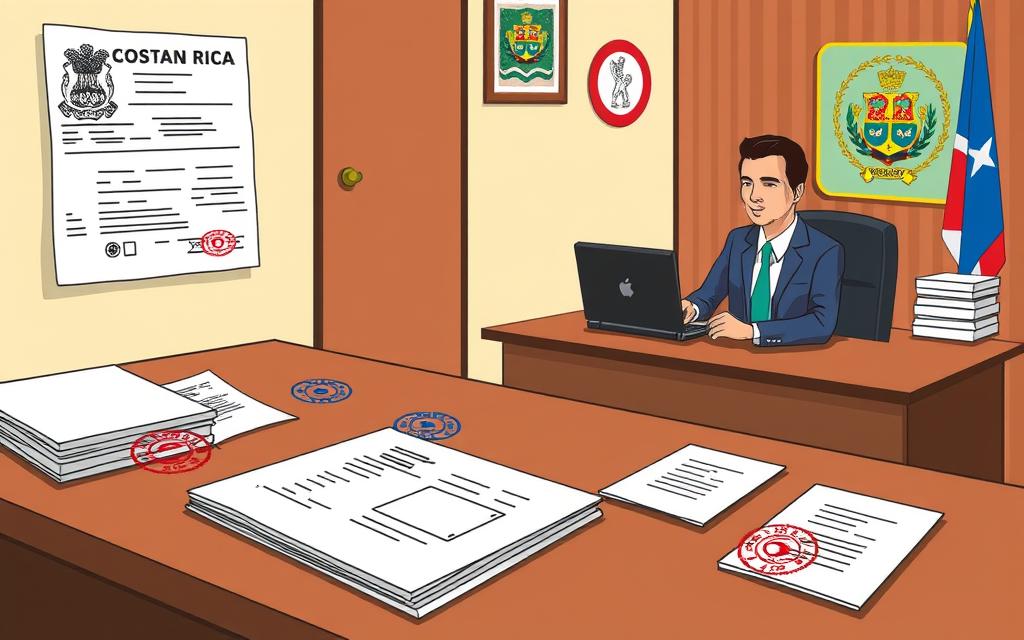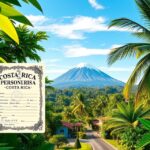Costa Rica Citizenship by Descent: Our Expert Guide

For individuals with Costa Rican ancestry, obtaining citizenship through descent is an attractive option. This pathway allows individuals to reconnect with their heritage and enjoy the benefits of dual nationality.
Costa Rica, known for its natural beauty and high quality of life, has become a desirable destination for those seeking to settle permanently or temporarily. Our comprehensive guide will walk you through the process of obtaining citizenship through your Costa Rican lineage.
Understanding the eligibility requirements and application process is essential. We specialize in guiding individuals through the complexities of Costa Rican immigration law, ensuring a smooth application process.
Understanding Costa Rica Citizenship by Descent
Individuals with Costa Rican ancestry can claim their nationality through citizenship by descent. This form of citizenship is particularly significant for those who have ancestral ties to Costa Rica but were not born within its borders.
What is Citizenship by Descent in Costa Rica?
Citizenship by descent in Costa Rica refers to the legal process through which individuals with Costa Rican ancestry can claim their nationality based on family connections rather than birth within the country's borders. This process is governed by specific laws that allow individuals to claim nationality based on their ancestry.
Legal Framework for Costa Rican Citizenship by Descent
The legal framework governing Costa Rica citizenship by descent is multifaceted, involving both constitutional provisions and specific legislation. Law N°7514, which amended Article 16 of the Constitution in 1995, is a pivotal piece of legislation that has shaped the country's approach to nationality. For more information on the dual citizenship requirements, you can visit our page on Costa Rica Dual Citizenship Requirements.
Benefits of Obtaining Costa Rican Citizenship
The benefits of obtaining Costa Rican citizenship include unrestricted rights to live and work in Costa Rica, access to the country's healthcare system, voting rights, and the ability to pass citizenship to future generations. Costa Rica's approach to citizenship honors ancestral ties and reflects the country's commitment to maintaining connections with its diaspora worldwide.
Eligibility Requirements for Costa Rica Citizenship by Descent

The process of obtaining Costa Rican citizenship by descent hinges on fulfilling certain eligibility conditions. Understanding these requirements is crucial for individuals who wish to claim their right to Costa Rican nationality based on their ancestry.
Qualifying Through Costa Rican Parents
One of the primary ways to qualify for Costa Rican citizenship by descent is through having Costa Rican parents. If one or both parents are Costa Rican citizens at the time of the individual's birth, they may be eligible for citizenship. This principle is based on the concept of jus sanguinis, or the right of blood, which determines one's nationality through the nationality of one's parents. To qualify, individuals must register their birth with the Costa Rican authorities within a certain timeframe.
Qualifying Through Costa Rican Grandparents
For those qualifying through Costa Rican grandparents, additional documentation and evidence may be required to establish the unbroken line of descent through multiple generations. This process involves proving direct lineage to a Costa Rican citizen, typically through official documentation. We recommend consulting the official resources, such as those found on Jaros CR, to understand the specific requirements.
Special Cases and Exceptions
Costa Rican nationality law recognizes several special cases and exceptions to standard eligibility requirements, particularly for indigenous populations and certain historical circumstances. These exceptions acknowledge unique circumstances affecting certain populations' ability to comply with standard citizenship registration procedures. Understanding these special cases is essential for individuals with complex family histories or those belonging to indigenous groups.
Required Documentation and Application Process
Applicants for Costa Rican citizenship by descent must carefully prepare the required documentation before initiating the application process. This involves gathering various personal and ancestral documents that prove eligibility for citizenship.
Essential Personal Documents
Essential personal documents include a valid passport, birth certificate, and marriage certificate (if applicable). These documents are crucial for verifying identity and nationality. For more information on the necessary identification documents, you can refer to our guide on Costa Rican identification cards.
Proof of Costa Rican Ancestry
Proof of Costa Rican ancestry is another critical requirement. This can be established through documents such as the birth or marriage certificates of Costa Rican parents or grandparents. Ensuring these documents are properly authenticated is vital.
Document Authentication and Translation
All foreign documents must be authenticated through either an apostille or legalization, depending on the country of origin. For countries not in the Hague Convention, legalization involving the foreign ministry and the Costa Rican consulate is required. Additionally, documents not in Spanish must be translated by a certified translator approved by the Costa Rican authorities.
Step-by-Step Application Guide
The process of obtaining Costa Rican citizenship by descent involves several key steps. The first step is filing with the Civil Registry, also known as the Tribunal Supremo de Elecciones. Applicants must submit their application along with the required documents, which include proof of Costa Rican ancestry and personal identification documents. Processing times typically range from 6-18 months, depending on the complexity of the case and the current volume of applications being processed by Costa Rican authorities.
Common Challenges and How to Overcome Them

When applying for Costa Rica citizenship by descent, several challenges may arise that can complicate the process. Applicants must be prepared to face these obstacles and know how to overcome them.
Obtaining Historical Documents
One of the most significant challenges is obtaining historical documents, particularly when records are decades old or from remote areas of Costa Rica. Many applicants struggle to locate birth or marriage certificates of their ancestors, often requiring research in provincial archives or church records.
Navigating Administrative Delays
Administrative delays are common in the Costa Rican immigration system. Processing times can vary significantly based on application volumes and staffing levels at the Tribunal Supremo de Elecciones. To mitigate this, applicants should follow up with the Civil Registry to ensure their application is being processed.
Dealing with Incomplete or Rejected Applications
Incomplete applications are a frequent cause of rejection. Applicants must ensure they provide all required documentation and properly authenticate their documents according to Costa Rican standards. Working with experienced immigration professionals can help overcome these challenges. For more information on the next steps after obtaining residency, visit our guide on post-residency steps.
How Our Expert Team Can Help You Obtain Costa Rican Citizenship

CRIE's expert team is committed to making the process of obtaining Costa Rican citizenship by descent as smooth as possible for our clients. With years of experience in handling residency and citizenship applications, we have developed a comprehensive understanding of the requirements and challenges involved.
Our services include personalized eligibility assessments to determine your qualification for Costa Rican citizenship based on your specific ancestry and family circumstances. We also locate and obtain historical documents from Costa Rican archives that prove your ancestral ties, even in challenging cases where records may be difficult to find.
We handle all aspects of document preparation, including authentication through apostille or legalization procedures for documents from countries worldwide. Our team arranges certified translations of all non-Spanish documents to meet the strict requirements of Costa Rican authorities. For more information on the differences between Costa Rican passports and residency identification, you can visit our detailed guide.
By leveraging our expertise in Costa Rican immigration law, we navigate complex cases and ensure that your application is submitted correctly. Our team provides comprehensive support throughout the entire process, from initial consultation to final approval. To learn more about our legal services in Costa Rica, please visit our website.


